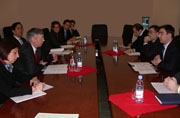
The Head of the IMF Mission Gave the Positive Assessment to the Activity of the National Bank of Georgia
 An International Monetary Fund Mission headed by Mr. David Owen, Deputy Director of Middle East and Central Asia Department is paying a one-week visit to Georgia. On February 29 he introduced Ms. Ana Lucia Coronel, a new Head of IMF Mission in Georgia to the National Bank of Georgia and made his first comments about the course of the mission. Ms. Ana Lucia Coronel is from Ecuador and has been employed at IMF for 9 years already.
An International Monetary Fund Mission headed by Mr. David Owen, Deputy Director of Middle East and Central Asia Department is paying a one-week visit to Georgia. On February 29 he introduced Ms. Ana Lucia Coronel, a new Head of IMF Mission in Georgia to the National Bank of Georgia and made his first comments about the course of the mission. Ms. Ana Lucia Coronel is from Ecuador and has been employed at IMF for 9 years already.
According to Mr. David Owen, the aim of the mission is to assess the past economic developments of Georgia and discuss the current situation as well as the main challenges. The main challenge for today is to control the inflation in such a way as not to slow down the economic growth. David Owen stressed that most of the world countries are facing the similar challenge as prices on basic goods are increasing for the last period of time. One of the important factors also is the crisis situation on the world financial markets.
"We are satisfied by the strong monetary policy conducted by the National Bank of Georgia. Tightening of the monetary policy is aimed at bringing down the inflation," - declared Mr. David Owen during his meeting with the press.
The Head of the mission also commented upon the government's new legislative initiative of reforming the financial sector. He mentioned that he supports the above-mentioned package as a whole as "it envisages the growth of the independence of the National Bank of Georgia and establishing the independent financial supervision agency. These independent institutions will facilitate the effective control of the inflation." In the opinion of the Head of the mission it is normal that NBG has enough independence to carry out the monetary policy. NBG should also be accountable and responsible for the results.
The Head of IMF mission has positive projections for the economic condition of Georgia, though he marked, that despite this "there are important risks, which originate from the global financial disbalance and it is planned to discuss these issues during the meetings with Georgian authorities."
Mr. Owen considers the decision of the Government of Georgia not to discuss the new program of cooperation with IMF at the present stage, reasonable. The mission will work in a so-called observing regime and visit Georgia at least once a year to assess the economic situation of Georgia. According to him the mission will play mostly the role of an advisor during these short-term visits.
After the end of his meeting with the representatives of IMF mission, the Acting President of NBG made comments for the press. "As Georgia has no program with the International Monetary Fund, the mission arrived with the aim to discuss the economic processes of the past period and main challenges facing the economy of Georgia during the current year as well as the monetary policy to be conducted by the National Bank of Georgia" - mentioned Mr. Amaglobeli.
According to the Acting President, participants of the meeting had discussed the main prognoses and assumptions, which NBG shall be guiding with during the fulfillment of its monetary policy in the course of the current year. Opinions of the monetary authorities of Georgia and IMF do not differ in this regard. Discussions about the detailed figures will be held next week.
Mr. Amaglobeli noted: "During our meeting the plans of the National Bank of Georgia regarding the move to the inflation targeting regime have been discussed. IMF welcomes and fully supports such changes in NBG policy. It also supports the idea of giving more independence to the National Bank of Georgia while conducting its monetary policy and increasing the quality of its public accountability."
IMF mission plans to arrange the summing briefing for the press on March 7, 2008.